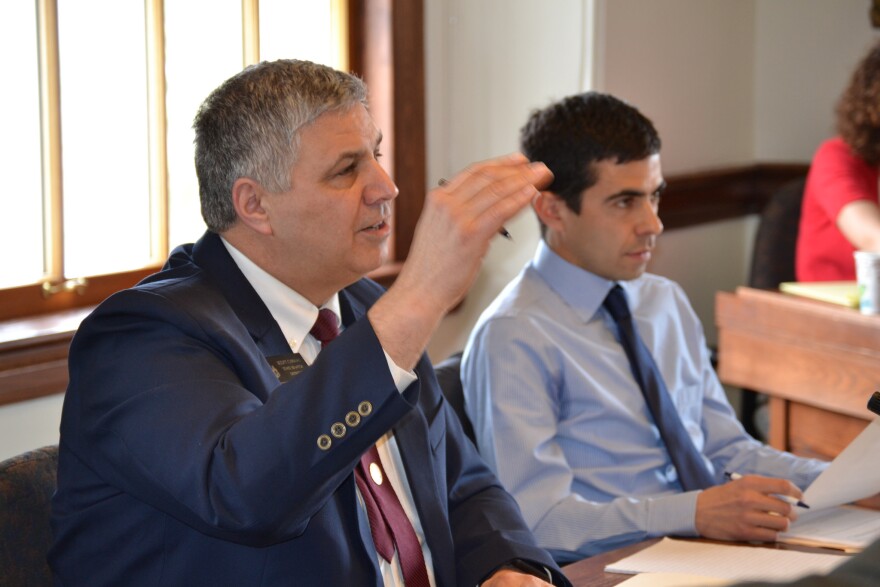AUGUSTA, Maine - A freshman Republican lawmaker is encountering some significant opposition - some from within his own party - over his proposal to send Maine's taxpayer-funded campaign law back to the voters for reconsideration. Sen. Eric Brakey of Auburn wants to repeal the law and redirect the millions of tax dollars spent on legislative campaigns toward local education costs. But some critics say Brakey actually has an ulterior motive.
With a title like "An Act To Repeal the Maine Clean Election Act and Direct the Savings To Be Used for the State's Contribution toward the Costs of Education Funding," you could say that Brakey's bill appears pretty straightforward at first glance.
But during his 45 minutes in front of the Legislature's Veterans and Legal Affairs Committee, Brakey made it clear that the real target of his legislation is a citizen initiative on the November ballot that would strengthen Maine's 19-year-old Clean Election Act. "The intent of this bill is to have a competing ballot measure," Brakey said.
And the measure that Brakey wants his bill to compete against is supported by Maine Citizens for Clean Elections, or MCCE . It would beef up the state's existing publicly-financed campaign law by giving those candidates additional money to offset spending by their privately-funded opponents.
Brakey spent a considerable portion of his appearance before the committee talking about whether - if given a second chance - voters might actually decide that the millions of taxpayer dollars spent on legislative campaigns might actually be put to better use elsewhere, like local school budgets, for example. And Brakey says the fact that Maine voters overwhelmingly approved Clean Elections at the ballot box doesn't make the law sacrosanct.
"In the recent past, Maine voters also decided that state government should be paying 55 percent of the bill for public education here in Maine," Brakey said. "It's my personal belief that, as long as that 55 percent mandate is left unfulfilled, not a single penny of taxpayer money should be spent on politcal yard signs and attack mailers. I think that's just a simple matter of spending priorities. I think the education of our kids is more important than campaign yard signs."

Seconds after his presentation, members of the Veterans and Legal Affairs Committee essentially declared open season on Brakey's bill - including one of his fellow Republicans, Sen. Sen. Scott Cyrway, of Benton. Cyrway told the freshman GOP lawmaker that his bill would actually put more money into state politics by triggering the creation of special interest groups to capture the additional education money. And that point led to a terse exchange.
Sen. Cyrway: "Well, I think you're contradicting yourself on this bill."
Sen. Brakey: "OK, I'm sorry; I don't completely follow the logic."
Former Republican state Sen. Ed Youngblood, of Brewer, told committee members that he also opposes the bill. Representing Maine Citizens for Clean Elections, Youngblood urged the panel to consider the positive role the law has played in Maine campaign spending.
"The Maine Clean Election system does provide accountability," Youngblood said. "The Clean Elections system keeps the voters in the driver's seat, which is where it belongs, to help make sure that our state government is responsible to the voters and not to wealthy contributors."
Democrats were also critical of the bill. Sen. John Patrick, a Rumford Democrat, says his constituents gladly pay the $5 qualifying contributions to Clean Election candidates in order to offset the $375 in a primary and $375 in a general election. Patrick pursued his point with Brakey.
Sen. Patrick: "A lot of those people believe that if someone gives you $700 in an election cycle, whether you're a citizen, whether you're a doctor, whether you're a lawyer, whether you're a business, that, in fact that is special interests. Would you agree?"
Sen. Brakey: "I just think, gee, if someone can buy your vote for $375, you must be a cheap date, you know?"
State House lobbyist Bob Howe, who also represents MCCE, said Brakey should be clear about what his intentions are since he wants his bill to compete on the ballot with the Clean Elections question.
"What it really is is an attempt to undermine the initiative," Howe said. "In order to succeed, it doesn't have to get a majority, all it has to do is deprive the initiative of a majority and the initiative fails -- even if repeal doesn't occur. That's what this is about. And I think we need to call a proverbial spade a spade."
Lawmakers are expected to start their review of the bill within the next two weeks.


